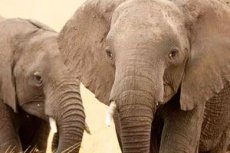Elephants spend 22 hours a day without sleep
Last reviewed: 23.04.2024

All iLive content is medically reviewed or fact checked to ensure as much factual accuracy as possible.
We have strict sourcing guidelines and only link to reputable media sites, academic research institutions and, whenever possible, medically peer reviewed studies. Note that the numbers in parentheses ([1], [2], etc.) are clickable links to these studies.
If you feel that any of our content is inaccurate, out-of-date, or otherwise questionable, please select it and press Ctrl + Enter.

American scientists, together with colleagues from South Africa, have determined that the African elephant practically does not spend time to sleep. Biologists spent a long time monitoring two wild elephant females, and found that they slept only two hours a day. Among mammalian creatures this is an absolute record.
Scientists for many years are interested in the details of the physiology of such large and unique animals as elephants. The first experiments related to the sleep period of elephants were set in the thirties of the twentieth century. Then the specialists established that the largest mammals of the planet prefer to sleep at night, on average 4-6 hours a day. But the results of these studies proved to be erroneous, because scientists studied the characteristics of elephants living in captivity. Biologists have long known the fact that almost any animal, being in captivity, with food and drink, sleeps longer than in the natural habitat.
Modern scientists approached the study more closely: they observed the wild females living in Botswana. The elephants were wearing devices with GPS catchers and gyroscopic devices, and their actives were attached to their trunks - devices that record the frequency of motor activity for a certain period of time.
Just to assess the duration of sleep, analyzing the activity of the brain of animals, scientists failed. The fact that the elephants have a very dense cranium, and implant electrodes into it was not easy.
According to the results of previous experiments, scientists knew that the motor activity of the trunk always correctly indicates whether the animal is awake or drowned in sleep. Therefore, they felt that the elephant is in a state of sleep, if its trunk is stationary for 5 minutes or more. Long-term observations made it possible to determine that the average duration of sleep in elephants was 2 hours. At the same time, their sleep was intermittent - for 20-60 minutes with small interruptions.
In extreme conditions, when animals had to travel long distances, fleeing persecution, or in search of food, they could do without sleep for up to 2 consecutive days. At the same time, their further sleep did not differ from what it was before the trip.
In addition, experts have determined the position of the elephant during sleep. It was found that in 70% of the elephant prefers to sleep standing up, and only occasionally falls.
Zoology specialist John Lescu, representing the Australian University La Troba, expressed his opinion that it is very important to determine the optimal posture of the animal during different phases of sleep. "For example, many cloven-hoofed mammals sleep standing, with half-open eyes, and even chew food. Therefore, it is likely that elephants also sleep for a long time, but their appearance and movements do not create such an impression. "
Nevertheless, the stated duration of night rest for elephants was fixed and while remains the shortest among all groups of mammals. Other well-known large mammals take a much longer time to sleep.
 [1]
[1]
